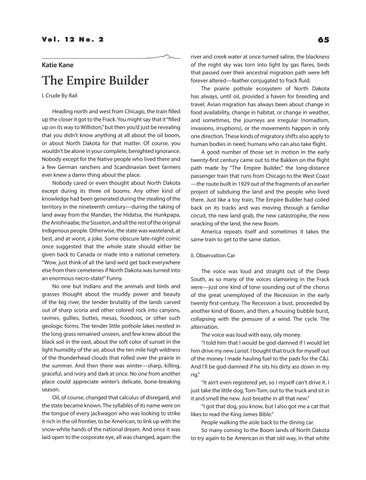65
V o l . 12 N o . 2 Katie Kane
The Empire Builder I. Crude By Rail Heading north and west from Chicago, the train filled up the closer it got to the Frack. You might say that it “filled up on its way to Williston,” but then you’d just be revealing that you didn’t know anything at all about the oil boom, or about North Dakota for that matter. Of course, you wouldn’t be alone in your complete, benighted ignorance. Nobody except for the Native people who lived there and a few German ranchers and Scandinavian beet farmers ever knew a damn thing about the place. Nobody cared or even thought about North Dakota except during its three oil booms. Any other kind of knowledge had been generated during the stealing of the territory in the nineteenth century—during the taking of land away from the Mandan, the Hidatsa, the Hunkpapa, the Anishnaabe, the Sisseton, and all the rest of the original Indigenous people. Otherwise, the state was wasteland, at best, and at worst, a joke. Some obscure late-night comic once suggested that the whole state should either be given back to Canada or made into a national cemetery. “Wow, just think of all the land we’d get back everywhere else from their cemeteries if North Dakota was turned into an enormous necro-state!” Funny. No one but Indians and the animals and birds and grasses thought about the muddy power and beauty of the big river, the tender brutality of the lands carved out of sharp scoria and other colored rock into canyons, ravines, gullies, buttes, mesas, hoodoos, or other such geologic forms. The tender little pothole lakes nestled in the long grass remained unseen, and few knew about the black soil in the east, about the soft color of sunset in the light humidity of the air, about the ten mile high wildness of the thunderhead clouds that rolled over the prairie in the summer. And then there was winter—sharp, killing, graceful, and ivory and dark at once. No one from another place could appreciate winter’s delicate, bone-breaking season. Oil, of course, changed that calculus of disregard, and the state became known. The syllables of its name were on the tongue of every jackwagon who was looking to strike it rich in the oil frontier, to be American, to link up with the snow-white hands of the national dream. And once it was laid open to the corporate eye, all was changed, again: the
river and creek water at once turned saline, the blackness of the night sky was torn into light by gas flares, birds that passed over their ancestral migration path were left forever altered—feather conjugated to frack fluid. The prairie pothole ecosystem of North Dakota has always, until oil, provided a haven for breeding and travel. Avian migration has always been about change in food availability, change in habitat, or change in weather, and sometimes, the journeys are irregular (nomadism, invasions, irruptions), or the movements happen in only one direction. These kinds of migratory shifts also apply to human bodies in need; humans who can also take flight. A good number of those set in motion in the early twenty-first century came out to the Bakken on the flight path made by “The Empire Builder,” the long-distance passenger train that runs from Chicago to the West Coast —the route built in 1929 out of the fragments of an earlier project of subduing the land and the people who lived there. Just like a toy train, The Empire Builder had coiled back on its tracks and was moving through a familiar circuit, the new land grab, the new catastrophe, the new wracking of the land, the new Boom. America repeats itself and sometimes it takes the same train to get to the same station. II. Observation Car The voice was loud and straight out of the Deep South, as so many of the voices clamoring in the Frack were—just one kind of tone sounding out of the chorus of the great unemployed of the Recession in the early twenty first-century. The Recession a bust, proceeded by another kind of Boom, and then, a housing bubble burst, collapsing with the pressure of a wind. The cycle. The alternation. The voice was loud with easy, oily money. “I told him that I would be god-damned if I would let him drive my new Lariat. I bought that truck for myself out of the money I made hauling fuel to the pads for the C&J. And I’ll be god-damned if he sits his dirty ass down in my rig.” “It ain’t even registered yet, so I myself can’t drive it. I just take the little dog, Tom-Tom, out to the truck and sit in it and smell the new. Just breathe in all that new.” “I got that dog, you know, but I also got me a cat that likes to read the King James Bible.” People walking the aisle back to the dining car. So many coming to the Boom lands of North Dakota to try again to be American in that old way, in that white
















